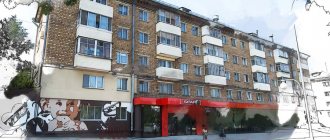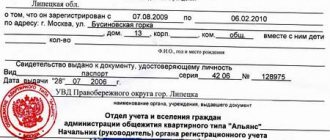Problems with finding a free parking space are familiar to all car owners, especially residents of big cities. Even an underground parking lot did not save us from these difficulties - even after purchasing a space in it, it was not clear which particular plot belonged to the buyer, and in order to sell one’s share it was necessary to collect written consent from all owners of the remaining plots, or by registering a deed of gift.
Subsequent changes in legislation improved the situation of car owners, giving them the right to privatize parking spaces.
Privatization from the legislator's point of view
All the nuances of designating parking spaces in the yard as private are regulated by law:
- Federal Law “On State Registration of Real Estate” dated July 13, 2015 No. 218-FZ;
- Government Decree No. 1090 of October 23, 1993 “On Traffic Rules”;
- Law of the Russian Federation “On the privatization of housing stock in the Russian Federation” dated July 4, 1991 N 1541-1;
- Federal Law “On Amendments to Part One of the Civil Code of the Russian Federation and Certain Legislative Acts of the Russian Federation” dated July 3, 2016 N 315-FZ.
All owners of apartments in the building have the right to privatize a parking space. When purchasing housing, citizens receive this right automatically if the territory near the house belongs to all residents on the basis of common shared ownership.
Parking spaces were recognized as full-fledged and independent real estate objects only from January 2021 (Federal Law No. 315-FZ of July 3, 2016), after which car owners received the right to fully dispose of specific parking spaces - sale, gift, inheritance, etc.
It turns out that in order to privatize a parking space, you need to go through the standard process of privatization of a newly created object - the developer or the owner himself must register the parking space with the cadastral register, register his ownership there, collect the entire package of required documents and pay a tax fee (duty).
Parking restrictions in residential areas
- Stopping and parking a vehicle in the yard with the engine running is prohibited (Part 2, Article 17 of the Traffic Regulations). For violation of this rule, a fine of 500 rubles may be imposed. (Part 1 of Article 12.19 of the Code of Administrative Offenses of the Russian Federation).
- For parking a car on the sidewalk, a fine of 1 thousand rubles is provided. (Part 3 of Article 12.19 of the Administrative Code). An incorrectly parked car may be towed. In this case, in addition to the fine, the car owner will have to pay for the work of the tow truck.
- The Code of Administrative Offenses of the Russian Federation does not provide for a fine for parking on lawns, so it is necessary to refer to regional legislation. For example, in St. Petersburg, a motorist will pay from 3 thousand to 5 thousand rubles for such a violation.
- For exceeding the noise level, the car owner can be fined 500 rubles. (Article 8.23 of the Code of Administrative Offenses of the Russian Federation).
- A heavy vehicle weighing more than 3.5 tons is prohibited from being parked in a residential area1.
- Parking of commercial vehicles and provision of parking spaces for them in blocks of apartment buildings is prohibited2.
- Organizing a “parking lot” business on the common territory of an apartment building is also prohibited3.
What the law says
The rules for the privatization of parking lots are specified in Federal Law No. 218-F3 “On State Registration of Real Estate”. So, to start the registration procedure, you need to check that all conditions are met:
- compliance of the parking area with the standards established by law;
- obtaining written consent from the owners of the remaining places;
- the area must be separated from the rest by special marks (for example, a number);
- parking space must be organized taking into account all legal requirements;
The standards establishing the size of parking spaces were introduced by Order of the Ministry of Economic Development of Russia dated December 7, 2016 No. 792, which came into force in January 2021:
- minimum - 5.3 by 2.5 meters;
- maximum – 6.2 by 3.6 meters.
It is important that the common property of the residents includes all communications (barriers, driveways, lighting).
How to complete the privatization procedure
The algorithm for transferring a parking space into private ownership is specified in the Federal Law “On Amendments to Part One of the Civil Code of the Russian Federation and Certain Legislative Acts of the Russian Federation” dated July 3, 2016 N 315-FZ. The main requirement of Article 6 is the presence of boundaries at the parking space.
To establish boundaries, you need to mark them (for example, with stickers or special paint) and draw up a technical passport for the object. Cadastral engineers will help with this.
Before starting the procedure, you need to go through the following steps:
- Gather all owners and make a decision to transfer part of the common territory into private ownership. The decision will be considered adopted subject to the consent of at least half of the members of the meeting;
- Draw up an act signed by all those present at the meeting;
- Invite cadastral specialists to carry out measurements and calculations at the expense of apartment owners;
- Receive an engineer's plan for the future parking drawn up by cadastral engineers;
- The chairman of the meeting, on behalf of all its members, applies to the cadastral authority with a passport, a document on ownership of the apartment and a plan to enter the parking lot into the state register;
- Obtain permission from the city administration to organize work;
- Approve the action plan in Rospotrebnadzor;
- Design the territory - install barriers, apply markings, etc.
A situation may arise when the local area is not registered as common shared ownership. In this case, it is municipal property, so you will need to conclude a lease agreement for a parking lot with the administration.
Norms and rules for creating parking spaces near an apartment building
When obtaining a permit, you must also take care of safety in the parking lot. This will help avoid problems in the future.
Firstly, it is worth paying attention to fire safety. Internal partitions and parking barriers must be made of non-combustible materials (brick or concrete). If the parking lot is adjacent to a building, then it must have emergency exits from the windows. Similar requirements are set out in Tech. regulations on fire safety requirements (2008).
Secondly, it is necessary to comply with the sanitary requirements for parking areas.
Thirdly, you should pay special attention to the location of the parking lot relative to residential buildings and other infrastructure. The larger the parking area, the greater the distance from the residential building.
Thus, parking for 10 cars should be located 10 m from residential buildings and 25 m from places intended for children to play. If the parking lot is designed for 250 cars, then it should be located at a distance of 50 meters from residential buildings.
It is worth noting that the law does not limit the size of a parking lot. The main thing is that the site meets the requirements of sanitary standards.
In addition, large parking lots (more than 500 cars) are prohibited near residential buildings. Parking for 100 or more spaces provides access to the transport network. These restrictions apply only to open parking areas.
What documents are required for privatization
To register a parking space, you need to collect a complete package of documents:
- Statement;
- A copy of the applicant’s identification document (passport);
- Documents on the basis of which the right arose - agreement of purchase and sale, donation, participation in shared construction;
- Extract from the Unified State Register of Real Estate;
- Technical parking plan developed by cadastral specialists;
- If the application is submitted by a representative - a notarized power of attorney;
- Minutes of the owners' meeting;
- Receipt of payment of the duty.
Duration of the procedure
According to the provisions of Article 16 of Federal Law No. 218-FZ, the process of registration of rights and cadastral registration is carried out within 5-12 working days .
Registration time depends on the reason for the request:
| Share participation in construction | 7-9 working days |
| Purchase and sale | 7-9 working days |
| Home inheritance | 3-5 working days |
| Mortgage | 5-7 working days |
In some cases, the period may be delayed if Rosreestr has requested additional information or documentation.
What is the difference between a parking lot and a parking lot?
To understand this, you should be guided by the norms of the Town Planning Code and the Traffic Rules. In the first case, the car is placed into storage “automatically”, and in the second, the owner of the place is not responsible for it. Let's figure out what else the law says about parking and parking.
Parking is a place (usually along roads, in various spaces of the road network, in areas near buildings) for placing a vehicle in a disabled state for a short period of time (clause 21, article 1 of the Town Planning Code and clause 1.2 of the Traffic Regulations). In courtyards it is free.
Parking is a territory or premises for long-term storage of a car on a paid basis (clause 2 of the Rules for the provision of parking services, approved by Decree of the Government of the Russian Federation No. 795 of November 17, 2001). Often these are covered garages and structures. Responsibility for this lies with the site employee.
When parked, the vehicle and property in the cabin are always under surveillance. But it costs much more than even paid parking. Parking is only possible in specially designated areas, and violation of the rules may result in a fine. A garage and a covered area are also considered parking. Here the car is protected from precipitation, and its appearance is maintained in good condition. Often parking is organized in the courtyards of administrative buildings or apartment buildings. They are necessary for citizens to leave their car during the working day or at night, make purchases or visit a guest.
Grounds for refusal
The applicant may be denied registration of property rights in the following cases:
- If the applicant does not have the right to use a parking space;
- The documents provided do not correspond to reality;
- The state duty was not paid;
- The future parking project was drawn up incorrectly. For example, its area extends to someone else’s local area;
- The area of the place is less or more than the norms established by the legislator.
In such situations, the privatization process is suspended, but not more than for 3 months.
Underwater rocks
In addition to the advantages - having your own parking space, no quarrels with neighbors, etc., there are also disadvantages:
- Increase in utility bills. The percentage depends on the area of the parking space;
- The need to pay taxes. Since a parking space is a full-fledged piece of real estate, it is subject to taxation. Its size is 0.3% of the cadastral value of the plot;
- High costs for the procedure. Duty, specialist services - all this can be expensive.
Proposed innovations
Among the most controversial and expected innovations, experts include the “Fair Russia” project on the relationship between parking spaces and property sizes. The essence of the project is as follows:
- For a classic one-room apartment with an average area of 30-33 sq.m, 1 parking space is provided. If the property area exceeds 50 sq.m., then its owner is entitled to 2 parking spaces.
- An apartment building (over 1000 apartments) must have 40 guest parking spaces. If we are talking about a large residential complex, where the number of apartments is more than 2000, then 80 places are required.
This bill is under development. It is far from perfect, because some owners of a one-room apartment have 2 cars, and owners of a two-room apartment can do without a personal vehicle. Consequently, some residents will be sorely short of parking spaces, while other parking spaces will be empty. The only solution will be voluntary agreements between the owners.
For your information
At the same time, a bill is being discussed that deals with paid parking near apartment buildings and large residential complexes. Deputies proposed that these parking lots be free at night. The implementation of the bill will require the additional creation of a register of all paid parking lots, thanks to which residents of nearby houses will be able to use them at night as additional free parking spaces. It is proposed to shift control over the implementation of this bill to regional authorities.








